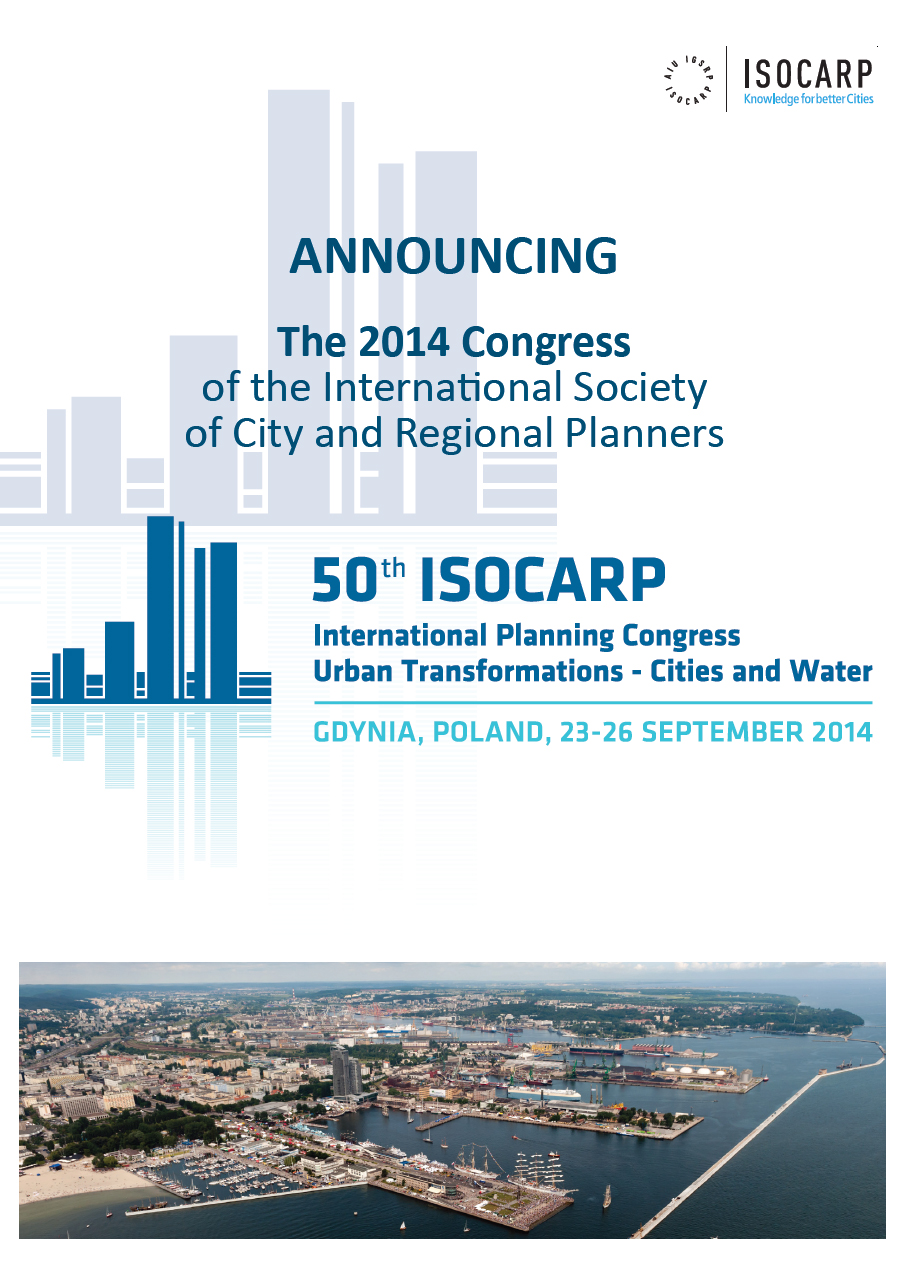Urban Transformations – Cities on water
50 th ISOCRAP International Planning Congress
Gdynia, Poland
23-26 September 2014
The conference
The ISOCARP conference is being hosted in 2014 in the City of Gdynia on the Baltic Sea, a city which is recognized for its contribution to the planning discipline and for their strive for innovation, change and making their city sustainable and liveable.
Focusing on the relationship of cities and water, the conference “Urban Transformations – Cities and Water” opens the opportunity to explore different aspects of the newly arising issues of urban development, and the inherent relationship between urban design, economic development, infrastructure development, social and environmental sustainability, and governance. The themes are timely chosen as many cities around the world are challenged with these issues in a different and previously not experienced way, or with newly emerging questions which were never present in earlier times.
Water related issues are significant in planning of any type and scale. The cities around the world were built along waterways, or along a coast of an ocean, sea or lake. The multifaceted relationships between urban planning and water has structured and influenced the development of metropolitan areas, cities, towns, rural areas and villages. The congress opens the opportunity to touch all aspects of urbanity, urban transformations, and the inherent relationships between the urban planning and water issues, from all angles, in all disciplines, and various scales.
Today, water related issues, and their role in urban and regional planning set major challenges which are addressed almost in any plan or project worldwide, and cause urban transformations in many aspects. There are water related places which champion urban planning and livelihood of cities and demonstrate the essence of urbanity and the quality of urban life, like urban waterfronts, city centers in proximity to rivers or coasts, neighborhoods, ports or other parts of the urban fabric.
The theme of the conference “Urban Transformations – Cities and Water” opens the opportunity to touch all aspects of urbanity and the inherent relationships between the urban planning and water issues, from all angles, in all disciplines, and various scales. Urban planners, environmentalists, sociologists, infrastructure planners, economists, river restoration planners and managers, decision makers, researchers and other professionals will enlighten their aspects and views. People from diverse disciplines, countries and professional backgrounds will present analyses of the past or the present, predictions of the future, research, planning or teaching.
The topics
The concurrent sessions of the congress will be held in 6 topic.
Topic 1: Urban Design, Landscape and Livable Cities
Water-related urban planning, design and vision; waterfronts and city centers close to or along rivers, oceans, seas, lakes; residential, commercial, industrial areas linked to water bodies; marinas; urban nodes and institutions along the water; sustainable and water sensitive related urban planning; cities on cliffs; underwater buildings; historic cities and towns, and heritage patterns or buildings along water and their development, renewal, or preservation; environmental design and sustainable development; waterways and parks along them; open spaces and connectivity along waterways; culture and water; urban life, festivals, performances, activities along waterfronts; inspiration of water; water related arts and cultural events; etc.
Topic 2: Social Aspects, Collaborations and Governance
Water as a connection or divider between cities or regions; water related collaborations; national or local cross-border cooperation; formal and informal networks across territorial limits (water, rivers), at local level in waterfront development, or at regional level along riverside areas; people and water; demographic aspects; migration and its impacts; public participation; stakeholders engagement; grassroots initiatives; governance and decision making processes and water related planning processes; legal aspects as building along coasts and rivers, water use and water rights, planning laws in relation to water issues; etc.
Topic 3: Economic, Leisure and Tourism Aspects
The economic impacts of waterfronts, urban renewal projects near water bodies, and development plans along coasts, beaches and rivers; cost benefit analysis of water related planning/water sensitive planning/river restoration projects; water and water related development as an economic catalyst in urban development; real estate issues along waterfronts, in relation to water views and along greenways; the impact of urban parks; urban growth and water issues; ports as an economic catalysts and factor in urban growth or depression of shrinking port activities; tourism along urban coast lines, beaches and rivers; tourism on the water; marinas; water sport; beach sport; bicycles paths; urban parks; etc.
Topic 4: Water Management
Water management; floods, flood plains, and flood protection measures and their impacts on urban planning; urban friendly and water sensitive water planning and engineering; hydrology and geohydrology in the city; river and lake restoration; cross-border rivers and lakes; water quality and pollution; drinking water issues; water related illness and health problems; underground water quality; water quantity, changes in water level and their impacts on urban areas; water harvesting; desalination; water recycling and reuse; greywater; links to nearby agricultural areas; etc.
Topic 5: Environment, Ecosystem and Climate Change
Environmental issues in urban and water related context; ecosystem services in urban areas; coasts and beaches; carrying capacity; protected areas and nature reserves in urban patterns; urban nature; conflicts between nature and urban development; ecological corridors; ecosystem preservation and restoration of rivers, lakes and sees with urban impacts; ecosystem health, diversity and quality of life; climate change impacts on urban areas; floods and droughts; climate change adaptation; rising of sea level, impacts and solutions; falling down cliffs; role of green spaces in urban areas for climate change; cities in water-scarce regions; coping with natural disasters (floods, typhoons, tsunamis); etc.
Track 6: Ports, Transportation and Infrastructures
Ports programs and planning; changes and future trends; relations with cities; impacts on cities and regions; reuse of industrial waterfronts; hinterland activities and links to the city; mixed uses; openness; transportation to the water and on the water; bridging waterways and their urban impacts; highways and roads along rivers and coasts; infrastructures near the water; overcoming infrastructure barriers; ports and infrastructures; flood defense and water harvesting infrastructures; dams; etc.
Congress Program:
https://www.isocarp.org/index.php?id=1670
Congress website and more information:
